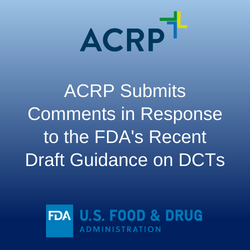Untangling the web of regulatory expectations regarding who among sponsors, investigators, and vendors will be held responsible—and when and why—for different key aspects of decentralized clinical trials (DCTs) lies at the crux of comments submitted by the Association of Clinical Research Professionals (ACRP) to the U.S. Food and Drug Administration (FDA) in response to the agency’s recent draft guidance on DCTs.
Following the release of some initial reactions to the draft guidance in May, volunteer members of ACRP’s DCT Think Tank Regulatory Working Group and other subject matter experts, including the ACRP Content Committee and ACRP Fellows, took a closer look at how FDA worded its document on “Decentralized Clinical Trials for Drugs, Biological Products, and Devices—Guidance for Industry, Investigators, and Other Stakeholders.”
In their combined feedback to FDA, ACRP members and volunteers weighed in on a variety of concerns they had over vague language and possible misconceptions about DCTs in the draft guidance, including:
- Clarity and Accuracy of Examples: ACRP members documented concerns about the clarity and accuracy of the examples provided in the Background section, specifically regarding the conflation of onsite and offsite activities, and the suggestion for better representation of “Telehealth” examples for third-party vendor home visits.
- Oversight and Implementation Challenges: ACRP members commented on the challenges related to providing adequate oversight for offsite trial activities in fully decentralized trials and questions about the requirement for physical locations for access to records and interviews. Members also raised suggestions for remote inspections and addressing liabilities and safety concerns for staff conducting home visits.
- Decision-making and Principal Investigator (PI) Discretion: ACRP members raised questions and made recommendations about decision-making processes, including considerations for telehealth visits, investigational product administration, quality control measures, and consent/assent of minors. Additionally, the role and responsibilities of local healthcare providers and PI oversight are subject to scrutiny.
- Packaging and Shipping Considerations: Members highlighted challenges and considerations related to the packaging and shipping of investigational products in DCTs.
- Remote Implementation and Reimbursement: Members suggested that there is a need to consider remote implementation in DCTs, including remote inspections and virtual interviews, and addressing the issue of subject reimbursement when there are no travel expenses involved.
“We are grateful for the input we received from so many ACRP volunteers to provide an authentic ‘voice of the clinical research professional’ in the comments submitted to the FDA,” said Bridget Gonzales, CCRC, Head of Educational Programs and Customer Success for ACRP. “DCTs represent a complex and evolving topic which is of ongoing interest to the many stakeholders in the clinical research enterprise who play vital roles in designing, implementing, regulating, and improving upon them.”
“As the trusted advocate championing the interests of clinical research professionals, sites, and the larger clinical research professional community, ACRP recognizes the paramount importance of incorporating diverse perspectives in shaping the future of clinical trials,” said Susan Landis, ACRP Executive Director. “By amplifying the collective voice of our dedicated members, ACRP is acting on its steadfast commitment to advancing the clinical research profession, ensuring excellence in clinical research, and helping to drive positive change in the conduct of clinical trials.”
DCTs, which saw a surge in use during the pandemic, are clinical trials where some or all of the trial-related activities occur at locations other than traditional clinical trial sites. As the pandemic wanes and clinical trial activities seek a new level of equilibrium based on the lessons learned since early 2020, FDA hopes to cement its recommendations for implementing DCTs in terms of how they are designed, how remote activities will be conducted, how digital health technologies will be used, how informed consent and institutional review board oversight will be managed, how investigational products will be handled, and how roles and responsibilities will be segmented out among the stakeholders, among other topics.
According to the draft guidance, in fully decentralized trials, “all activities take place at locations other than traditional trial sites,” such as at the homes of trial participants or in local healthcare facilities that are convenient for trial participants. “In hybrid DCTs,” the FDA continues, “some trial activities involve in-person visits by trial participants to traditional clinical trial sites, and other activities are conducted at locations other than traditional clinical trial sites, such as participants’ homes.” Further, “FDA’s regulatory requirements for investigations of medical products are the same for DCTs and traditional site-based clinical trials.”
Edited by Gary Cramer and Kara Bastarache



